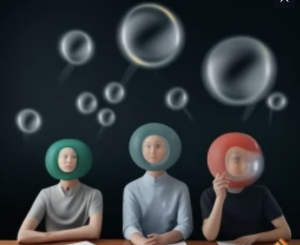A client of mine is separating from her husband because he cannot separate from his iPhone. These days, when couples go out to eat together, the first thing they do is pull out their devices, if they are not already in their clutches, and place them on the table between each other. There is nothing stranger than watching two lovers in a dark and quiet restaurant, drinking red wine, feeding each other treats, while simultaneously watching as every few minutes or so, that darkness and quiet are impaled by the light and buzzing coming from one of their technological devices. And then even stranger, the person to whom it belongs actually putting down their red wine, unraveling their foot from their partner’s calf, pulling their gaze away from their lover’s, in order to check that device—perhaps to find out that their groupon for a pair of sneakers is now expired.
There are no more tables for two; tables for four are our most intimate encounters, two humans and two devices, sometimes we need a booth to fit them all. In the digital age, we no longer give any one person our full and total attention. When we are together, even in our most intimate relationships, some part of us is not there, not present. We are anticipating, subtly and not so subtly awaiting the next alert from our device, waiting for something else to appear. The message then is that the person in front of us is not enough, or not enough to warrant our turning off “what else” is possible, the what else with which our Smartphone constantly beckons.
When our phone or our partner’s phone is on the table with us, it is there, a part of the meeting. We can’t fully settle in to what is happening here in the relationship. Some part of our consciousness is on alert for the signals that are coming in. Even when someone doesn’t answer the chime or bugle that calls out for their attention, still, they often pick up the phone, check what the chime is about, place their phone back on the table in its proper place and then again return to their partner. This whole process interrupts the experience that is happening with another person. There is a re-entry into the conversation and the person who is now returned to feels differently with that interruption. At some level, they feel less important, that their company is not deserving of exclusivity. I notice with my psychotherapy clients that what people then do with this message of non-importance is determined by their own psychology. Some try to be more interesting so as to make themselves worthy of their partner turning off his device. Others retreat into insecurity and loneliness. Still others just get on their own device, and find their own way out of the moment and the relationship, thereby balancing out the disconnection and de-valuing process. At this moment in history, we are changing psychologically as we generate new defense mechanisms to manage our own devaluation in each other’s lives and the downgrading of our place on the priority list. However we compensate or don’t, that phone on the table, lighting up, sounding off, and just being a presence there, making it a foursome not a twosome, fundamentally alters the relationship, the intimacy, and the entire interaction. Even when it is not delivering a tangible message, the phone at the table is delivering a message of enormous meaning.
Attention is a profoundly important method by which we show each other that we matter in each other’s lives. The gaze of someone really with us, not distracted, not elsewhere, just here, is like a gift of the most divine substance. There is a flow of energy, an energetic circle that occurs when two people are wholly with each other, undistracted, fully landed. In this circle it is possible for both individual “I”s to disappear, and to discover a third entity that is the energy and flow of the relationship itself, without separation. This happens when both parties agree to be present with the other person, and make the choice to close the door to the potential “what else-s” and “what’s next-s” that call out from the blinking lights of technology. When we include our devices in our intimate interactions, we disrupt the energetic circle of intimacy, and with it the possibility for two “I”-s becoming one “We.” When our phones are on the table with us, between us, we are a group of firm individual entities. We don’t have to risk joining each other, slipping into the experience and our partner, and leaving ourself behind. At the same time, sadly, we don’t get to leave ourself behind, join the experience, and our partner, and taste the real sweetness of intimacy.
At the same time that we are downgrading the importance of our human friends as we award equal status to our technological companions, another trend is developing that also contributes to the loss of intimacy and value in our relationships. With the explosion of technology in our lives, we have lost the distinction between public and private space. We no longer have places where we are unreachable. It used to be that if you were at home with your family or out on a date or some other such personal encounter, you were not available to interact with everyone else. The setting aside of times and places where the outside world was not allowed, special places that were for the special people in our lives, not everyone, added to the sense of importance of those private spaces and the relationships within them. Now, always on, always available to the public through our device, always relating with the public through social media, we don’t set aside a special importance to those in our private world. With technology going everywhere with us, the public is now as important as the private. And yet, if we still want private space to feel different than public space, intimate relationships to feel different than non-intimate relationships, then it is up to us to separate the two, and treat them differently. We need to have times and places where we are not with everyone, but rather, with those that really matter to us. The choice to deem certain people and places different, more important, and worth turning off the “who/what else?” button for, then infuses such people and places with meaning. The system delivers what we put into it. If we treat someone as important, they become important. If we treat them as on par with the public, no more important than any another business associate or acquaintance, they will assume that generic value in our life. Ultimately, our behavior determines the depth of our relationships and thus the amount of nourishment that we receive from them.
The next time you go out with someone you care about, or stay home with someone you care about, turn the Smartphone off, turn the tablet off, turn it all off and better yet, put it away—out of sight. Make the decision to make private time different than public time. Take the risk that for the two hours you will be at the restaurant you won’t need to be reached. Or, even if you do, that it whatever it is can wait a few minutes for your attention. Ask yourself, “Is what I am checking for really as important as this person?” This system, of just being in one place with one other person, worked for eons, before technology made it something strange, before it became something that we need to consciously choose, that involves going against the social stream. The small act of simply refraining from putting your phone on the table, dare I even say leaving it off altogether, has the power to create an entirely different and more intimate experience. There are so many things that we can do to make our lives better and many of them are quite difficult and require a lot of effort. But this one, this tiny choice to put away our device when with a friend, has the power to improve our life with an enormity that far outweighs the effort required. In this case, the cost benefit ratio is staggering.



One Response
This was one of the most amazing articles I have ever read about social media and phones. I am a counselor in a high school and I have to demand that my studetns turn their phones off and it is a struggle every time. I even constructed a 4 foot iphone to send a message to them to turn their phones off. I have also noticed my own over use and my personal need to be disconnected. I am planning a retreat this weekend by shutting my phone off and leaving a message so that my parents or family don’t think I am dead somewhere. I am tired of feeling like I am a doctor on call at every moment. It is disturbing. Thank you for this reminder.